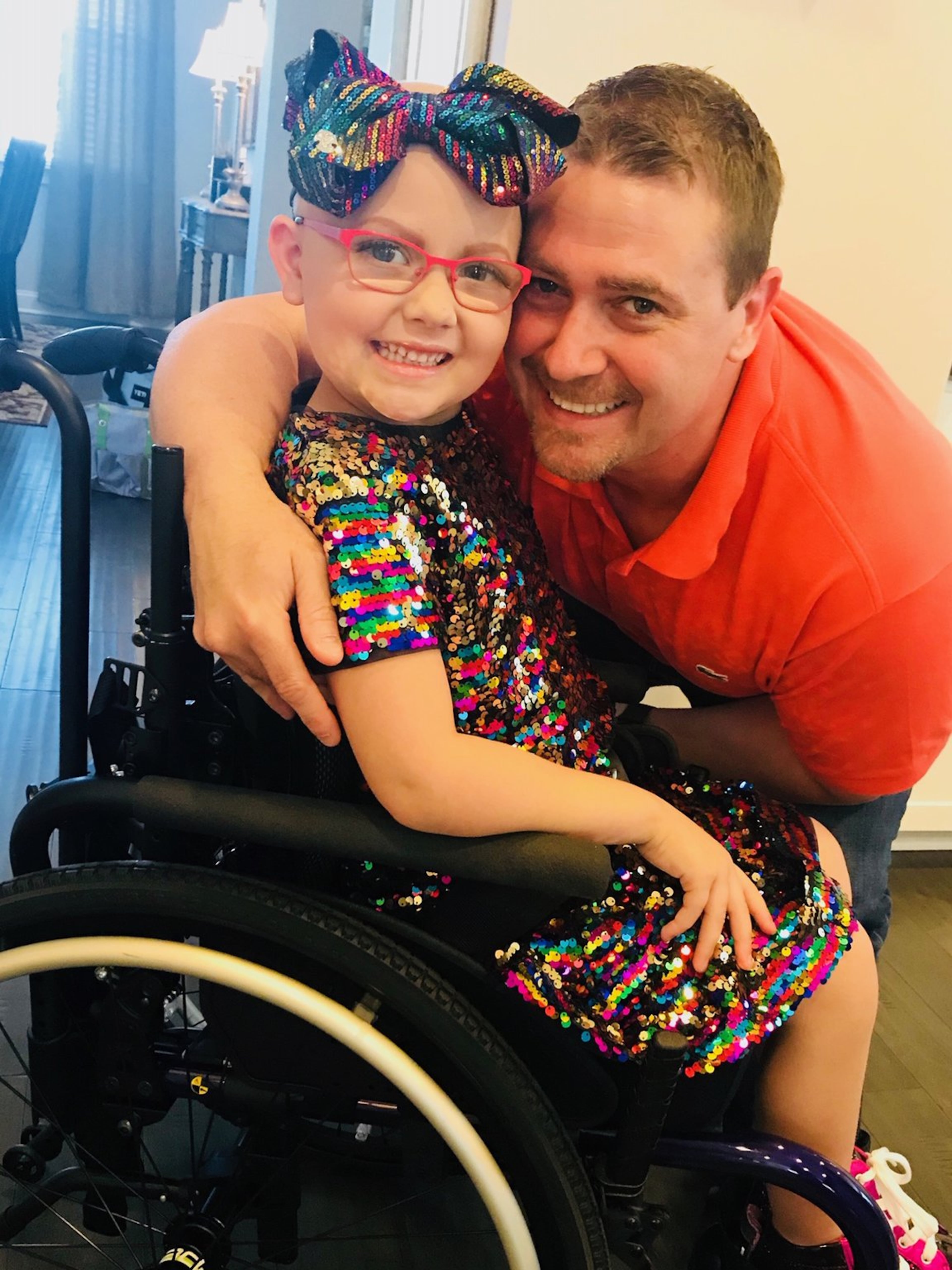Peach Bowl Inc. donates $20 million to Children’s for clinical trials

Peach Bowl Inc., which owns and operates the Chick-fil-A Peach Bowl, planned to give up to $10 million to Children's Healthcare of Atlanta to help find more treatments and possibly cures for pediatric cancer, but a spunky 6-year-old girl named Anna Charles Hollis motivated the organization to give more — a lot more.
Always smiling and singing, even when confined to a pink wheelchair, Anna Charles, affectionately called “AC,” daughter of Benji Hollis, an executive at Peach Bowl, died exactly a year ago Monday, only five months after being diagnosed with acute myeloid leukemia (AML), a cancer of the white blood cells.
Peach Bowl announced Monday a $20 million donation to Children's Healthcare of Atlanta's Aflac Cancer and Blood Disorders Center — with all of the money earmarked for funding clinical trials aimed at developing new treatments to fight childhood cancers. The donation, one of the largest-ever single donations to Children's Healthcare of Atlanta, will establish the Peach Bowl LegACy Fund (capital AC in honor of AC).

“It’s in our mission to give back and this was a member of our family,” said Gary Stokan, CEO of Peach Bowl Inc., a nonprofit organization that also owns and operates the Chick-fil-A Kickoff Game and is a founding sponsor of the College Football Hall of Fame in Atlanta.
The five-year survival rate for children with AML is about 65%. In the past 40 years, only about 25 drugs have been approved for use in children with cancer, a number that pales in comparison to the hundreds developed for adult cancers. And while survival rates overall for pediatric cancer have been steadily rising, survival rates for some types of childhood cancer remain discouragingly low, including AML and bone cancers (especially when not caught early). Young cancer survivors also often face long-term complications, including heart disease, infertility or secondary cancers related to their treatment.
“This is an unbelievable gift,” said Dr. Daniel Wechsler, director of pediatric oncology at Children’s. “What this means is we will be able to do cutting-edge clinical trials we would not be able to do otherwise.”
Wechsler said the Peach Bowl LegACy Fund will help support clinical trials aimed at discovering potential treatments, and ones with less harmful side effects. He said they plan to get started early in 2020. One area of promise is immunotherapy. Cancer treatments like chemotherapy and radiation use medications or high-energy X-rays to kill cancer cells. Immunotherapy is different because it takes advantage of the body’s own immune system to fight off the cancer.
In spring 2018, AC, an energetic child, struggled to recover from a routine tonsillectomy. She then complained about knee and back pain. Her parents, Benji and LeeAnna, headed to the emergency room at Children’s Healthcare of Atlanta, where AC was diagnosed with leukemia the same day, and then specifically AML the following day. Within a few days, a mass of AML cells was discovered on AC’s spine. She underwent emergency surgery to remove the mass, but it left her paralyzed from the waist down. For the next five months, the Buford family rarely left Children’s Scottish Rite hospital.
“Her light was so bright, those last five months in the hospital were intentional. We had a choice: be bitter or angry, or be present, to live in the moment and love each other,” said Benji Hollis, who is vice president of sales for Peach Bowl. He has worked there for the past 16 years, starting as an intern. “We chose to love.”

Inside the hospital room, awash in a rainbow of colors and unicorns, AC, her parents, and younger sister, Everlee, played board games, filled out Mad Libs, and built castles out of Legos. They played air hockey in the activity room. And AC, often wearing brightly colored clothing, zoomed up and down the hallway in her wheelchair, even doing complete, 360-degree turns. After four rounds of grueling chemotherapy, AC relapsed. AC was preparing for a bone marrow transplant when her body began to shut down.
On a recent afternoon, Benji Hollis watched a video of AC smiling and singing (with sass) “Me Too” by Meghan Trainor. It was a moment captured only three weeks before AC died.
“We didn’t think we were going to lose her until that morning,” said Hollis with tears in his eyes. “We had hope, and we still have hope. It’s a different kind of hope.”
Nearly 16,000 children in the U.S. are diagnosed with pediatric cancer each year. Children’s Aflac Cancer Center, one of the largest pediatric cancer and blood disorders programs in the country, diagnosed 488 new cases of pediatric cancer in 2018. Only 4% of the National Institutes of Health’s cancer research funding goes to pediatric cancer research.
MORE: Children's Healthcare of Atlanta patient returns as nurse
The differences between cancers in adults and children go well beyond age. The types of cancer that are seen in children are different from those in adults, and pediatric tumors have unique genetic makeup. Children can often tolerate higher doses of chemotherapy, and the side effects they experience may also be different. Outcomes for cancers in children are also generally better than for adults, with overall pediatric cancer cure rates of around 80%.
“When we lose a patient, and it unfortunately happens more often than we would like, we want something good to come of it,” said Wechsler. “We were all pretty devastated when we realized we would not be able to cure AC. … The Peach Bowl gift is an incredible tribute to honor AC’s memory.”


